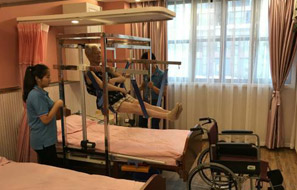More details are expected in the case of pregnant woman's death
The death of a 26-year-old pregnant woman surnamed Ma, who jumped off the delivery room at the fifth floor of the First Hospital of Yulin when she suffered great pain on Aug 31, continues sparking discussions on China's social networks.
Especially, after the hospital posted Medical Informed Consent (MIC) online, saying Ma twice asked her husband Yan Zhuangzhuang to sign on a document about C-section birth but was twice rejected, many netizens scolded the husband for being coldblooded.
But Xiu Minghe, a lawyer specializing in medical disputes at Beijing-based Jingshi Law Firm, said that even if what the hospital said is true, the hospital should also be taken accountable because it could legally do C-section birth for Ma without her husband's signature.
According to the General Provisions of Civil Law, a citizen's own true volition for lawful civil activities should be respected.. "That means, as long as Ma had a sober mind and asked for C-section birth, the hospital could consider it, instead of waiting for the consent of her husband, the authorized person."
Xiu also quoted the Tort Law as saying that, when it is necessary to take major treatment measures such as surgical operation, medical staff are responsible of "telling either the patients or their family about potential risks and obtain a written consent".
"In practice, many hospitals choose to tell both, but to tell the patient is sufficient," he said.
He added that, even if both the patient and his/her family refuse to sign, the hospital could take necessary medical measures on its dean's signature, because it is up to the hospital to make professional decisions.
However, a problem in reality is, many medical staff don't dare to take such measures because of the rampant patient-doctor tensions or even conflicts.
An obstetrical doctor at West China Women's and Children's Hospital in Chengdu of Sichuan province, who requires to keep anonymous, said that the case reminds residents nationwide not to be over careful with C-section birth.
There was a time when C-section birth was quite rampant. In February 2010, a World Health Organization report showed that in China C-section births accounted for 46 percent of all the births in 2007 and 2008, much higher than the line of 15 percent the WHO suggests.
According to the obstetrical doctor, in the past few years, domestic medical authorities have taken measures to control C-section birth, because it is a surgical operation and the pregnant woman needs more days to recover after delivery. Babies born in this way face higher risk of wet-lung disease as they did not pass through the birth canal of the mother.
Yet it is still a most effective measure against dystocia and it saved many lives of women and children. "For the health of mothers and children, we encourage natural births, but we cannot demonize C-section birth", he said. "It is a last resort but a necessary last measure."
Currently all reports say Ma felt so great pain at the delivery room, implying she needed a C-section birth. But both interviewees point out that "China's medical standards allow medical staff to consider a C-section birth under nine conditions, such as uterine abnormality and oversize of embryo; heavy pain is not one of them so it is not any reason for C-section birth."
Xiu said local authorities should read the all medical records of Ma to decide whether she truly needed a C-section birth, and the obstetrical doctor said there might be more details. Both expect more investigation that dig into details can find out the truth.
And before that neither media nor the netizens should jump at a quick conclusion and point fingers at others easily.
Contact the writer at zhangzhouxiang@chinadaily.com.cn
- Teen who lived in a Guangxi cave starts high school
- China cracks down on illegal fishing to protect marine environment
- China Aviation Expo highlights homegrown high-end products, technology
- Traditional Chinese medicine attracts fans abroad
- Health authorities launch investigation into death of expectant mother




















